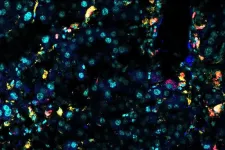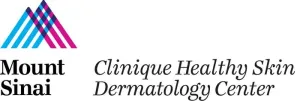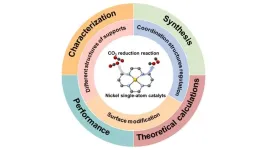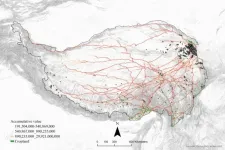(Press-News.org) For their study in Science Advances, the researchers reconstructed temperatures and precipitation for the period from 200 BC to 600 AD, with a resolution of three years. This means that two data points cover a period of three years – an extremely high resolution for paleoclimate researchers. The period extends from the so-called Roman Climatic Optimum to the Late Antique Little Ice Age. This period also includes three major pandemics known from historians’ records: the Antonine Plague (around 165 to 180 AD), the Cyprian Plague (around 251 to 266) and the Justinian Plague (from around 540).
Each of these pandemics followed a change in climate: the Antonine Plague occurred during a cold spell that followed several decades of cooling and drought. The Cyprian plague coincided with a second phase of severe cooling. Finally, the Justinian Plague followed an extreme cooling in the 6th century. "There was always a parallel," explains first author Prof. Karin Zonneveld from MARUM and the Department of Geosciences at the University of Bremen. "A phase of climate change was followed by a pandemic outbreak."
Zonneveld and her colleagues used so-called dinoflagellates to reconstruct past temperature and precipitation patterns. These unicellular organisms live in the sunlit upper part of the ocean and form cysts that are deposited as fossils on the ocean floor. Dinoflagellates have different preferences for their environment, with some living only in colder waters and others only in warmer waters. Some prefer waters with lots of nutrients, while others can only live in very clean, nutrient-poor waters, explains Zonneveld. "If the conditions in the upper waters change, the composition of the cyst species that accumulate on the seabed also changes." This creates a very high-resolution archive that goes back further than, for example, tree rings in this region can.
Karin Zonneveld and her colleagues took the samples from a core originating from the Gulf of Taranto. Volcanoes regularly erupt in southern Italy – the most prominent example is the eruption of Mount Vesuvius in 79 AD, which destroyed Pompeii. The ash emitted rises into the atmosphere, trickles down onto the water and then sinks to the seabed. There it forms a thin layer of ash, known as a cryptotephra. "Volcanic ash contains many small glass particles that can easily be seen with a polarizing microscope," explains Karin Zonneveld. "The elemental composition of the glass particles in the ash of each volcano is unique and can even be different for individual eruptions of the same volcano. With the help of tiny needles, we were able to pick out individual pieces of glass and analyze their elemental composition in collaboration with the Bremen volcanologist Andreas Klügel." In this way, the deposits could be precisely linked to volcanic eruptions of the Vesuvius and volcanoes on the island of Lipari of which the times of the eruptions was known. This allowed an exact dating of the core sediments.
For the missing piece of the puzzle, a coincidence brought Zonneveld together with her co-author, historian Prof. Kyle Harper from the University of Oklahoma (USA). He, too, had long suspected a causal link between climate and pandemics. Together, they were able to precisely date and compare the climate data as well as glass particle analyses with historical events.
The researchers conclude that climate-related stress could trigger a pandemic outbreak or intensify disease outbreaks - for example, because food is scarce and people become more susceptible for diseases. Harper and Zonneveld agree that this could hold important information for the future: "It's true that we have a completely different society at the moment than in ancient times, mainly because of modern science and everything that goes with it - germ theory, antibiotics, vaccines, clean water. But there are also parallels. Much like in Roman times, climate is still an important factor affecting fundamental aspects that influence our wellbeing. These include agriculture, access to clean water, biodiversity, geographical distribution and migration of organisms. Studying the resilience of ancient societies to climate change and exploring how climate change and the incidence of infectious diseases are linked could give us a better insight into the climate change-related challenges we face today."
Contact:
Prof. Dr. Karin Zonneveld
Marine Palynology
MARUM – Center for Marine Environmental Sciences and the Department of Geosciences at the University of Bremen
Phone: + 49 421 218-65797
Email: kzonneveld@marum.de
MARUM produces fundamental scientific knowledge about the role of the ocean and the seafloor in the total Earth system. The dynamics of the oceans and the seabed significantly impact the entire Earth system through the interaction of geological, physical, biological and chemical processes. These influence both the climate and the global carbon cycle, resulting in the creation of unique biological systems. MARUM is committed to fundamental and unbiased research in the interests of society, the marine environment, and in accordance with the sustainability goals of the United Nations. It publishes its quality-assured scientific data to make it publicly available. MARUM informs the public about new discoveries in the marine environment and provides practical knowledge through its dialogue with society. MARUM cooperation with companies and industrial partners is carried out in accordance with its goal of protecting the marine environment.
END
Did climate change trigger pandemics in antiquity?
Samples from the ocean floor provide the first high-resolution regional climate record and prove a link to pandemics
2024-02-02
ELSE PRESS RELEASES FROM THIS DATE:
Outstanding success in the Excellence Strategy: TU Dresden enters the next round with three new Clusters of Excellence initiatives
2024-02-02
As a result, TUD ranks second overall in the number of calls for proposals in the current competition nationwide. This is according to today’s joint announcement (February 2, 2024) by the German Research Foundation (DFG) and the German Science and Humanities Council (WR). An international panel of experts appointed by the DFG and the WR through the Joint Science Conference (GWK) has assessed a total of 143 draft proposals over the last few days and selected 41 as valuable funding opportunities.
In addition, TUD's three existing Clusters of Excellence have expressed their intent to the DFG that they wish to continue their outstanding research work. TUD, therefore, ...
HMSOM researchers: Data shows clinical trials becoming more inclusive
2024-02-02
Clinical trials and medical research have been historically lacking in diversity among all groups.
But recent trends have been turning the tide at least a little bit toward equity and inclusivity, according to a new meta-analysis published by a team of investigators from the Hackensack Meridian School of Medicine (HMSOM) and the Hackensack Meridian Health Research Institute (HMHRI).
The meta-analysis of clinical trials which included New Jersey patients from 2017 to 2022 show a snapshot of more diverse representation - and better reporting of race and ethnicity factors, according to the new paper in the Elsevier ...
CAR T cells show promise against age-related diseases in mice
2024-02-02
Highlights
Laboratory research led by MSK and Cold Spring Harbor Laboratory demonstrates the potential for CAR T cells to improve “healthspan” by eliminating senescent cells associated with aging-related diseases.
Not only was the treatment able to improve the metabolic function of aging mice and mice fed a high-fat diet, but it also proved protective against metabolic decline when given to younger mice.
The CAR T cell-based approach offers a powerful alternative to more traditional small-molecule drugs target senescent cells, supported by its long-lasting effects and the potential to fine-tune ...
Clinique partners with Icahn School of Medicine at Mount Sinai to establish the Mount Sinai-Clinique Healthy Skin Dermatology Center
2024-02-02
New York, NY (February 2, 2024) – Clinique and Icahn School of Medicine at Mount Sinai today announced a philanthropic partnership to establish the Mount Sinai-Clinique Healthy Skin Dermatology Center. The Center will develop forward-thinking research in dermatology, exploring the biological underpinnings of how skin ages, skin allergies and inflammatory or eczematous skin conditions, including eczema (or atopic dermatitis) and contact dermatitis. Rooted in a shared mission to conduct dermatological research that improves patients’ lives, the partnership will focus on applicable scientific discovery and leading-edge innovation to modernize allergy science in order to ...
Strategies for enhancing the performance of nickel single-atom catalysts for the electroreduction of CO2 to CO
2024-02-02
Electrocatalytic reduction of carbon dioxide (CO2) is considered as an effective strategy for mitigating the energy crisis and the greenhouse effect. Among the multiple reduction products, CO is regarded as having the highest market value as it is a crucial feedstock for Fischer-Tropsch process which can synthesize high-value long-chain hydrocarbons. Since the carbon dioxide reduction reaction (CO2RR) has complex intermediates and multiple proton-coupled electron transfer processes, improving the reaction activity and products selectivity remain two great challenges.
Single-atom catalysts (SACs) have the advantages of high atom utilization, tunable coordination structure ...
Brexit-induced spatial restrictions reveal alarming increase of fishing fleet’s carbon footprint
2024-02-02
In a study published today in Marine Policy, researchers have unveiled striking evidence that fisheries management decisions such as spatial fisheries restrictions can increase greenhouse gas emissions. The study, conducted by a team of scientists led by postdoctoral researcher Kim Scherrer at the University of Bergen, sheds light on the unforeseen consequences of policy changes on fishing fleets and their carbon footprint.
In the North Atlantic, international agreements often allow fleets to follow the fish across national borders. This allows fishers to catch the fish where it is most efficient. But when the UK left the EU (Brexit), ...
Scammed! Animals ‘led by the nose’ to leave plants alone
2024-02-02
University of Sydney researchers have shown it is possible to shield plants from the hungry maws of herbivorous mammals by fooling them with the smell of a variety they typically avoid.
Findings from the study published in Nature Ecology & Evolution show tree seedlings planted next to the decoy smell solution were 20 times less likely to be eaten by animals.
“This is equivalent to the seedlings being surrounded by actual plants that are unpalatable to the herbivore. In most cases it does trick the animals into leaving the plants alone,” said PhD student Patrick ...
Why are people climate change deniers?
2024-02-02
Do climate change deniers bend the facts to avoid having to modify their environmentally harmful behavior? Researchers from the University of Bonn and the Institute of Labor Economics (IZA) ran an online experiment involving 4,000 US adults, and found no evidence to support this idea. The authors of the study were themselves surprised by the results. Whether they are good or bad news for the fight against global heating remains to be seen. The study is being published in the journal Nature Climate Change. STRICTLY EMBARGOED: Do not publish before Friday, February 02, 11 a.m. CET!
A surprisingly large number of people ...
Epigenetic status determines metastasis
2024-02-02
Scientists from the German Cancer Research Center (DKFZ) and Heidelberg University investigated in mice how spreading tumor cells behave at the site of metastasis: Some tumor cells immediately start to form metastases. Others leave the blood vessel and may then enter a long period of dormancy. What determines which path the cancer cells take is their epigenetic status. This was also confirmed in experiments with human tumor cells. The results of the study could pave the way for novel diagnostic and therapeutic applications.
What makes cancer so dangerous? ...
Prehistoric mobility among Tibetan farmers, herders shaped highland settlement patterns, cultural interaction, study finds
2024-02-02
The 1 million-square-mile Tibetan Plateau — often called the “roof of the world” — is the highest landmass in the world, averaging 14,000 feet in altitude. Despite the extreme environment, humans have been permanent inhabitants there since prehistoric times.
Farming and herding play major roles in the economy of the Tibetan Plateau today — as they have throughout history. To make the most of a difficult environment, farmers, agropastoralists and mobile herders interact and move in conjunction with one another, which in turn shapes ...
LAST 30 PRESS RELEASES:
Scientists develop new gut health measure that tracks disease
Rice gene discovery could cut fertiliser use while protecting yields
Jumping ‘DNA parasites’ linked to early stages of tumour formation
Ultra-sensitive CAR T cells provide potential strategy to treat solid tumors
Early Neanderthal-Human interbreeding was strongly sex biased
North American bird declines are widespread and accelerating in agricultural hotspots
Researchers recommend strategies for improved genetic privacy legislation
How birds achieve sweet success
More sensitive cell therapy may be a HIT against solid cancers
Scientists map how aging reshapes cells across the entire mammalian body
Hotspots of accelerated bird decline linked to agricultural activity
How ancient attraction shaped the human genome
NJIT faculty named Senior Members of the National Academy of Inventors
App aids substance use recovery in vulnerable populations
College students nationwide received lifesaving education on sudden cardiac death
Oak Ridge National Laboratory launches the Next-Generation Data Centers Institute
Improved short-term sea level change predictions with better AI training
UAlbany researchers develop new laser technique to test mRNA-based therapeutics
New water-treatment system removes nitrogen, phosphorus from farm tile drainage
Major Canadian study finds strong link between cannabis, anxiety and depression
New discovery of younger Ediacaran biota
Lymphovenous bypass: Potential surgical treatment for Alzheimer's disease?
When safety starts with a text message
CSIC develops an antibody that protects immune system cells in vitro from a dangerous hospital-acquired bacterium
New study challenges assumptions behind Africa’s Green Revolution efforts and calls for farmer-centered development models
Immune cells link lactation to long-lasting health
Evolution: Ancient mosquitoes developed a taste for early hominins
Pickleball players’ reported use of protective eyewear
Changes in organ donation after circulatory death in the US
Fertility preservation in people with cancer
[Press-News.org] Did climate change trigger pandemics in antiquity?Samples from the ocean floor provide the first high-resolution regional climate record and prove a link to pandemics








